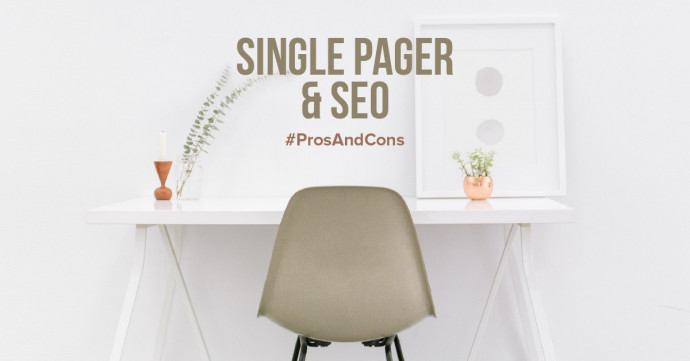Pros And Cons For a Single Page Website For SEO
Although single page websites aren’t as trendy as they once were, they are still quite popular. Many web designers are choosing this option instead of using multi-page websites to provide their clients with business websites.
However, before deciding to go with a single page site, or not, you should consider all the impacts of that decision. Most importantly, how does a (single page site)[https://www.webfx.com/blog/web-design/the-science-behind-a-single-page-website] impact SEO? You can start by checking out the SEO pros and cons of single page websites below.

The SEO Downside of Single Page Websites
There Are Advanced Strategies That Don’t Work on Single Page Sites It can be difficult to implement specific, advanced SEO strategies if you choose a single page design. One example of this that really stands out is siloing. This is a design methodology where you divide your website into different areas based on a specific subject matter, and then divide those areas into subcategories.
The benefit of siloing is that it allows you to create very detailed content about each subject, and subtopic. This increases your authority for each of these topics, allows you to provide answers for the most popular user questions about these topics, and most importantly allows you to boost SEO by increasing your ranking on keyword searches based on these topics.
It’s Difficult to Get Into Detail on a Single Page Site
Derek Wallace, web designer at TopEssayWriting says, “As a general rule, single page sites simply don’t have as much detail as other sites. Because of this, you may not be able to provide the amount of information that your visitors want.” Think of it like this, with a multipage website, you might be able to provide a summary on a particular topic on your website, then link out to another page that goes into detail on that topic. When all of your information must be on one page, that’s an issue.
If you include too much text, you can end up with that ‘wall of text’ look that can be overwhelming for website visitors. This is especially the case with mobile users. It’s also why you must pay very close attention to detail when it comes to the layout of your page, and how it is structured. Still, even with a very well-thought-out layout, you simply won’t be able to provide the same amount of detail that you would with a multi-page layout.
If you do choose a single page layout, consider dividing the page into different sections according to the subject you cover. Each new section will have a new topic, almost as if it were being displayed on its own page. This could counteract the possibility of higher bounce rates from users who don’t find the information they want.
Keyword Targeting Can be Negatively Impacted
Unfortunately, one of the design purposes for a single page website impacts how you can target for keywords. Specifically, a single page site is meant to focus on a singular idea. That makes it pretty difficult to optimize for a range of different keywords. Instead, you’ll find yourself focusing on the main keyword along with some related long-tail keywords, and a few alternatives.
If you choose a multi-page website, you can use each page as an opportunity to focus on a new keyword. This, in turn, will increase your ranking for each of these keywords.
You should ask yourself how much you depend on organic search results from Google to drive new customers to your website. If this is an important metric for you to track, then you might consider a multi-page website. If not, then you obviously would not be concerned about ranking high for a variety of keyword phrases.
Multi-Page Website Benefits
You Can Better Target a Very Specific Group If you are interested in targeting a niche audience that is likely to want the same user experience, a single-page website could be a very good choice for you. In addition to this, it is much easier to steer your visitors towards taking a specific action when you have a single-page website. With a multi-page site, users could click in and out of various pages instead of following a specific path that you have created to them.
With a single-page website, users get the information you want them to in the specific order you presented. You can optimize that order to suit your purposes. This is also beneficial if you have one specific grouping of keywords for which you want to optimize.
The only downside is that your users will have to scroll down through all the information on your page to find the details they are looking for. That could be frustrating if they don’t find the other information relevant to them. On the other hand, this is a good technique to put information in front of the reader that they may not even realize is useful for them. This is a good reason to be very choosy about your content, to use high-quality visuals, and to ensure that everything on your page adds value. There’s no room for fluff or filler on single page sites. Try some of these tools to ensure the best possible content on your single-page website; Grammarly, ClassyEssay, Hemingway, BeGraded, Studyker, Canva.
Mobile Users Will Have a Better User Experience
If you have a single page site, chances are it will render quite well for your mobile users. This is ideal as most searches are done from mobile devices. In addition to this, page load speed is usually faster than multi-page websites. Navigation is also simple as all the user has to do is scroll.
Final Thoughts Overall, multi-page websites are usually better for SEO. However, if you are interested in the benefits of a single page site, it may be because SEO is simply not a high priority for you. That’s absolutely valid.
Ultimately, as you make the decision to use a single page or multi-page design, you must consider the needs of your business. Specifically, what are you trying to accomplish, and what do you want your visitors to do when they visit your site.
The key to this is in developing an understanding of your target audience. Ask yourself what will give them the ideal user experience?
Author Bio: Nicole D.Garrison is a content strategist, writer, and contributor at WriteScout, Subjecto and a number of platforms for marketing specialists. She is a dedicated and experienced author who pays particular attention to quality research. At her free time, Nicole is a passionate runner and a curious beekeeper. Moreover, she runs her own blog LiveInspiredMagazine.
-
Jose PallasDigital strategist€ 0,37 pm
-
Izrrael SandreaDigital Marketing€ 2,00 pm
-
Van Koenig TatariEcommerce Specialist€ 0,33 pm
-
Harrie van der LubbeCreative DeveloperFree
-
Jose W.Digital marketing€ 2,50 pm
-
Rick De VliegerOnline marketeer€ 2,83 pm



















